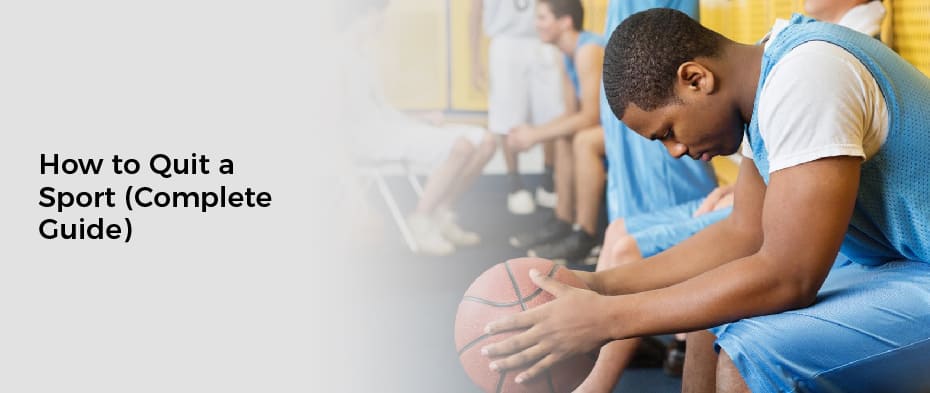How to Quit a Sport (Complete Guide)

December 6, 2022
Before telling your child that it is time to quit a sport, take some time to consider why they want to quit. You can also ask your child’s therapists and doctors for advice. You can also ask your child’s coach or teacher if they’d prefer you to take a break from playing a sport. If you want to quit a sport, it’s important to take a week or two off.
Lessons To Be Learned by Allowing a Child to Quit a Sport
Allowing your child to quit a sport can be an important lesson in commitment and discipline. It can also help them develop the life skills they need to succeed, such as listening to their feelings and putting their needs first. Ultimately, this decision is up to you.
The first step is to investigate why your child is quitting. Even small obstacles can cause a child to become irritable, resulting in a decision to quit. To avoid this scenario, make sure you are present for practice and speak to the coach about what is bothering your child.
Another valuable lesson to be learned by allowing a child quit a sport is perseverance. Many kids struggle with the idea of failing, especially if they’re not the best or the most valuable player. It can be tempting for these kids to complain about their failures to the coach or league, but perseverance is a skill that can carry them far in life.
Signs That It Might Be Time To Quit
If your child has been showing signs of a lack of enjoyment from a sport, it might be time to give it up. This is a decision that needs to be made with the help of both you and your child. Often, children don’t say what they really feel about a particular sport, and parents must make educated guesses based on their communication and behavior. While children’s sports have many benefits, especially for their health and social development, they are primarily meant to be fun. If your child is expressing frustrations and complaining about the sport, you may need to switch to another activity or discipline.
Quitting a sport is not easy for a child, but it’s important to keep in mind that there are many different ways to determine whether your child should quit. One common sign is if your child is putting their sport before other things. Instead of attending birthday parties, sleepovers, and other activities, they are spending a lot of time practicing and playing sports.
Reasons To Quit A Sport
There are many reasons to quit a sport, including personal and mental health issues. You may be feeling overwhelmed by the demands of your sport and not want to play anymore. In such a situation, you should discuss your decision with a trusted adult. Try to figure out whether it’s better to take a break or find a new sport that you enjoy more. If you have trouble getting along with teammates, talk to your coach and suggest ways to improve the relationship.
Academic reasons are another common reason for quitting a sport. Athletes who are busy with school work or balancing time with their families may not have the time to continue. Whether you’re trying to quit a sport because you’re too busy with schoolwork or because you’re too exhausted to continue playing, your decision may be difficult to make. But it doesn’t mean that the sport doesn’t have value for you. You might even be happier without it.
One of the main reasons why kids quit playing a sport is that they are not having fun. Even if you’re talented, if you are not enjoying the sport, you may want to quit. The pressure and the friendship you’ve developed may be preventing you from enjoying it.
Taking a Week Or Two Off Before Quitting A Sport
It can be hard to quit a sport when you’ve grown up with a ‘win at all costs mentality. Even if you’re not feeling a competitive urge, you can use a week or two off to rejuvenate your body and boost your motivation.
The first step is to identify your reasons for quitting the sport. If you’re feeling overwhelmed or overworked, try cutting down on your practice hours or taking time off from your schedule. If you’re having trouble relating to your teammates, try talking to the coach and suggesting changes that will help improve the situation.
Many parents don’t allow their children to quit sports because they worry they’ll give up when times get tough or if team commitments are important. Others think that life is difficult enough and that children shouldn’t get pushed to quit if they don’t want to. However, both sides should be cautious about allowing their children to quit if they don’t enjoy the sport.
Shaking Hands With Your Coach After Quitting A Sport
If you’ve decided to quit a sport, you might find it difficult to shake hands with your coach. However, you can still do so to show respect. If you’re an athlete, this gesture shows your coach that you’ve given it your all and appreciate his guidance. It also helps you avoid disappointing your team.
Read Also: How to Put Tattoos on Created Player 2k23
While some coaches might argue that handshakes are only appropriate in the lines of play, others feel that they are an important part of sportsmanship. Youth baseball coach Kevin Barnaby is a firm supporter of handshakes. Shaking hands with your coach is a traditional sign of respect and goodwill, and is considered a sign of good sportsmanship.





